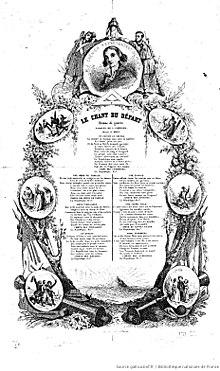Chant du départ
| English: 'The Song of Departure' | |
|---|---|
 | |
National anthem of the First French Empire Personal anthem of the President of France | |
| Lyrics | Marie-Joseph Chénier, 1799 |
| Music | Étienne Méhul |
| Adopted | 1804 (as national anthem) 1974 (as presidential anthem) |
| Relinquished | 1815 (as national anthem) |
| Audio sample | |
Le Chant du Depart, anthem of the First French Empire (1931 recording)[1] | |
"Le Chant du départ" (French: [lə ʃɑ̃ dy de.paʁ]; lit. 'The Song of Departure') is a French revolutionary war song, composed by Étienne Méhul and written by Marie-Joseph Chénier in 1794. It was the official anthem of the French Empire,[2] and it is currently the unofficial regional anthem of French Guiana and the presidential anthem of France.[3]
The song was nicknamed "the brother of the Marseillaise" by French Republican soldiers.[2]
The song was first performed on 14 July 1794.[2] 18,000 copies of the music sheets were immediately printed and distributed to the army.[2] Its original title was "Anthem to Liberty"; it was changed to its present title by Robespierre.[2]
The song is a musical tableau: each of the seven stanzas is sung by a different character or group of characters:
- The first stanza is the discourse of a deputy cheering his soldiers and encouraging them for the fight for the Republic.
- The second stanza is the song of a mother offering the life of her son to the fatherland.
- The fourth stanza is sung by children exalting Joseph Agricol Viala and Joseph Bara, children aged 15 and 13, respectively, who had died for Revolutionary France. According to legend, Bara was surrounded by royalist Vendeans, when he was ordered to shout "Long live Louis XVII"; he shouted "Long live the Republic" instead and was executed on the spot. Viala was killed by a bullet as he was trying to sabotage an enemy bridge. His last words were "I die, but I die for the Republic."
The song is still in the repertoire of the French Army. It was sung during World War I.[4] Valéry Giscard d'Estaing used it as his campaign song for the presidential election of 1974; as a president, he often had it played by troops along with the "Marseillaise".[2]
Lyrics
[edit]| French original | English translation |
|---|---|
I. (Un député du Peuple) |
I. (A deputy of the People) |
II. (Une mère de famille) |
II. (A mother of a family) |
III. (Deux vieillards) |
III. (Two old men) |
IV. (Un enfant) |
IV. (A child) |
V. (Une épouse) |
V. (A wife) |
VI. (Une jeune fille) |
VI. (A young girl) |
VII. (Trois guerriers) |
VII. (Three warriors) |
References
[edit]- ^ "Columbia (U.K.) matrix WL3407. Le chant du départ / Pierre Dupont; Musique de la Garde Republicaine; Georges Thill". Discography of American Historical Recordings. Archived from the original on Feb 14, 2024.
- ^ a b c d e f "Le Chant du Départ". Napoleon.org. Archived from the original on 2012-03-08. Retrieved 2012-02-09.
- ^ "Music for Bastille Day - Cultural Services of the French Embassy". frenchculture.org. Archived from the original on 2021-10-19. Retrieved 2020-07-24.
- ^ Becker, Jean-Jacques (January–March 1985). "1914 : partis pour un été". Vingtième Siècle : Revue d'histoire. 5 (5): 169–171. doi:10.3406/xxs.1985.1126.
External links
[edit] Works related to Chant du départ at Wikisource
Works related to Chant du départ at Wikisource French Wikisource has original text related to this article: Chant du départ
French Wikisource has original text related to this article: Chant du départ- Audio on YouTube
